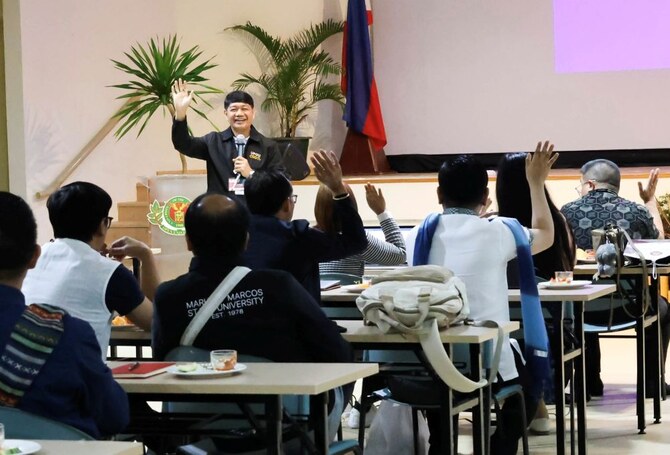New Delhi: There were only a handful of students at the first BDS India rally last month, but the movement is now gaining ground across the country as more people are willing to join efforts to boycott products and companies linked to Israel.
While many grassroots groups have been organizing in India to protest Israel’s deadly onslaught on Gaza that began in October 2023, it is only recently that the efforts began to focus on advancing the global Boycott, Divestment and Sanctions campaign.
The first such protest took place in Hyderabad on April 5 and similar rallies and public awareness meetings have since been held in 10 other Indian cities.
“For the last two months, we have been actively promoting the BDS movement in India ... we have been going to different neighborhoods, campuses, working-class areas and we are seeing that the common masses are very receptive,” Sreeja Dontireddy, BDS India coordinator, told Arab News on Wednesday.
“We began with maybe five to 10 people in each city or team. Now that number has definitely grown to much more than that, to around 20-25. And different people come to different campaigns. The teams are constantly growing because more and more people are volunteering to be part of the campaign.”
The Boycott, Divestment and Sanctions movement is a global campaign launched in 2005 to pressure Israel to comply with international law and respect Palestinian rights.
It calls for the boycott of Israeli goods and institutions, divestment from companies complicit in violations of Palestinian rights, as well as sanctions against the Israeli state. BDS is inspired by the anti-apartheid movement in South Africa and its goal is to end the occupation of Palestinian land and uphold the right of return for Palestinian refugees to their homeland.
Support for Palestine has always been an important part of India’s foreign policy even before Indian independence from British colonial rule in 1947.
Many years before the establishment of Israel, Mahatma Gandhi, the leader of India’s freedom movement, had opposed a Jewish nation-state in Palestine, deeming it inhumane and wrong.
But a change in the Indian government’s stance has been visible over the past few years. During Israel’s deadly campaign in Gaza, India has even supplied it with weapons.
“Our country’s government might directly or indirectly support Israel, but that doesn’t mean that the people of India also must do so ... when we explain to them that this is a liberation struggle and Palestine is fighting for its independence, they are very receptive,” Dontireddy said.
“The people of Palestine are relentlessly fighting with whatever means they have. And this is a source of inspiration and awe for all of us. And it is our duty to stand by them. And BDS offers something operative to do in that instance, and it allows us also to create a tangible effect that will affect and injure the sort of hegemony that Israel enjoys.”
BDS India activists have been raising awareness about companies and products that have links to Israel. They approach people individually, in local neighborhoods, share their product lists with shopkeepers and have some of them place boycott-related stickers and materials on their displays.
They also organize rallies in front of international outlets featured on global boycott lists.
“People are clearly angry about what is happening in Palestine. They really want to do something,” said Swapnaja Limkar, a member of the BDS India movement in Pune.
“Initially, there were like 10 people. After a month or so, we have about 200 people in every protest. We have organized some boycott protests outside Starbucks, outside Domino’s Pizza, and are campaigning every day. We have gathered around 200 people who are in support of Palestine in Pune right now.”
The most recent BDS India protests took place on May 10 in front of Domino’s outlets in Delhi, Mumbai, Pune, Visakhapatnam, Hyderabad, Patna and Vijayawada.
“Not only physically, but also on social media, people have shown presence as well as support in larger numbers,” said Akriti Chaudhary from BDS India in Delhi.
“The movement has been growing steadily, and more and more people are joining the campaign ... we have suffered 200 years of colonialism. No one can understand better than us what it means. That’s why the Palestinian issue resonates with us, and we need to stand with the people of Palestine in this hour of crisis, as they face an existential threat from Zionist Israel.”























